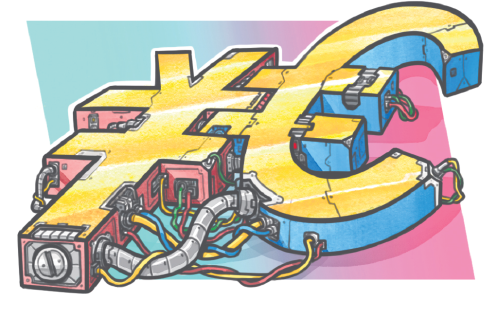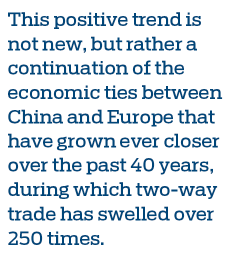Maintaining good momentum
Positive trend of ever closer EU-China economic relations will continue despite change of US administration
This year has witnessed the strengthening of China-EU economic relations. Provisional foreign trade figures from the European Union last month revealed that China replaced the United States as the EU's biggest trading partner during the first seven months of 2020, with bilateral trade growing 2.6 percent year-on-year. Investment from the EU to China also grew, with investment from the Netherlands alone surging 150 percent and that from Germany, France and the United Kingdom also growing significantly. With the outbreak of the novel coronavirus, the importance of the China-Europe Railway Express has been significantly elevated as it has played a key role in securing the flow of trade and medical supplies between Europe and China. By Nov 5, trains had more than 10,000 freight trips this year.
However, this positive trend is not new, but rather a continuation of the economic ties between China and Europe that have grown ever closer over the past 40 years, during which two-way trade has swelled over 250 times. Looking ahead, this good momentum is likely to continue and China-EU economic relations will keep growing in the future.
First, China, as the world's second-largest economy, is going through a period of industrial and consumption upgrading which will provide European companies with a vast array of market opportunities. In 2018 alone, China's per capita disposable income grew by 6.5 percent. As a result, many believe that for a number of European companies, such as those from Germany, China is on its way to becoming a top export destination. Especially since China's industrial upgrading is also spurring a large market for machinery, technologies and robotics. This will mean significant opportunities for many European high-tech companies and investment funds.
Second, China and Europe are expected to reach agreement on their comprehensive bilateral investment treaty this year. The conclusion of the bilateral investment treaty will become a landmark in China-EU economic relations, providing more access for European investment into China and vice versa. It will also mean that European investment and companies entering the Chinese market will have more favorable conditions, making European businesses comparatively more competitive and well-placed.
Third, the Fifth Plenary Session of the 19th Central Committee of the Communist Party of China proposed that China seek to establish a dual circulation economic paradigm. This is an important measure for China's economic development, but it also provides opportunities for European businesses to grow with the Chinese market.
There is another factor at play in China-EU economic relations-the United States. Although the EU is moving closer to China economically, on matters of security it still relies on the North Atlantic Treaty Organization and the US security guarantee. This limits the EU's ability to develop entirely independent relations with China. This has prompted some analysts to worry that with the incoming US administration keen to restore good relations with its allies, China-EU economic relations could be de-prioritized from the EU's agenda. Some even worry that the US may influence the EU's decision on finalizing the bilateral investment treaty with China.
These concerns are overplayed.
First, businesses have their own motivation when choosing where to invest and with whom they trade, and that is the pursuit of profits. As long as the Chinese market continues to grow, it will be attractive for European businesses and as long as China continues to commit to opening-up, as it has over the past four decades, it will provide a stable environment for European investment. However bilateral political relations change, the profit motive of European businesses will not change.
Second, the EU is unlikely to change its position on the bilateral investment treaty because of the US. The EU is a bureaucratic machine that relies heavily on very complex consultation and consent procedures. Therefore to reach its current position was a long process carefully calculated to integrate the different interests and concerns of its member states. Therefore, the EU is unlikely to either toughen or ease its position because of an outsider's influence.
Third, the US, the EU and China have growing common interests such as tackling climate change, fighting against the pandemic and maintaining multilateralism. Cooperation over these issues will help to build trust and boost confidence in bilateral and trilateral economic relations. It will also bring more stability to the world, which will be important for post-pandemic economic recovery.


The author is an assistant professor at Hunan University. The author contributed this article to China Watch, a think tank powered by China Daily.














